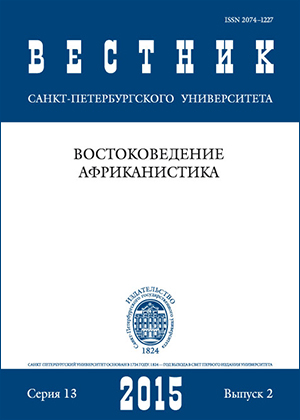Personal-demonstrative pronouns in Bengali as units of secondary nomination (evidence from the story “One day, some day” by A. Bišbās)
Abstract
This article attempts to describe some features of the anaphoric use of personal-demonstrative pronouns in the Bengali language on the basis of a short story written by a contemporary Bengali writer A. Bišbās. To achieve this goal, a brief description of the grammatical categories of the demonstrative pronouns (e, o, se, tā) is presented, followed by the analysis of problems of their classification, specific features of their use, and some potential and actual referential conflicts (and their solutions) arising from this specificity. The results of the study identify the directions and scope for further research in the field means of ensuring the integrity and coherence of the Oriental text. Refs 16. Table 1.
Keywords:
ensuring the integrity and coherence of the text, secondary nomination, pronominal anaphora, referential conflict, Bengali, pronouns
Downloads
References
Downloads
Published
How to Cite
Issue
Section
License
Articles of "Vestnik of Saint Petersburg University. Asian and African Studies" are open access distributed under the terms of the License Agreement with Saint Petersburg State University, which permits to the authors unrestricted distribution and self-archiving free of charge.





